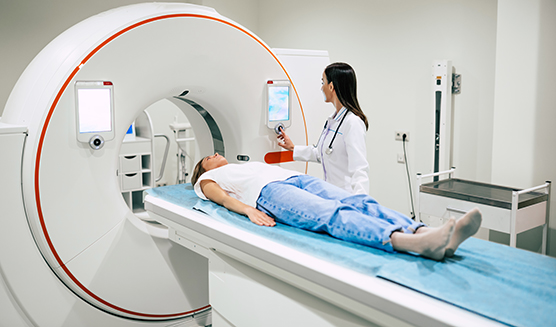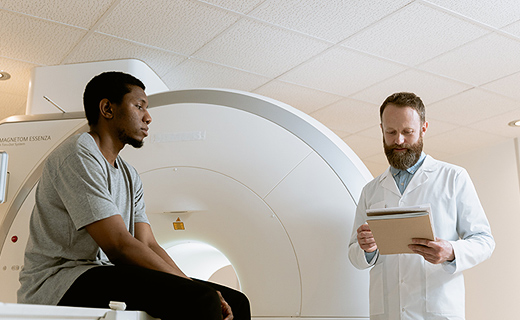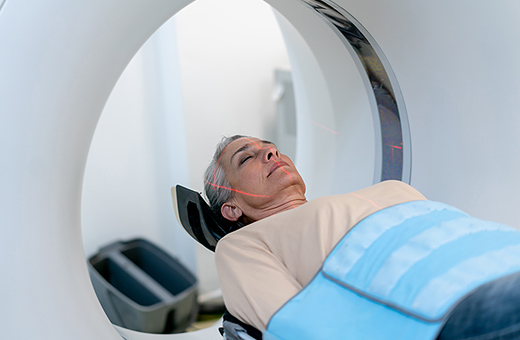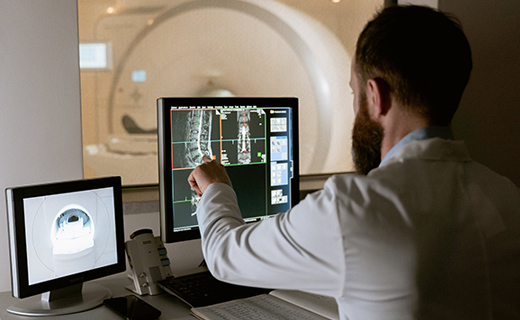CT Scan
We use the latest CT scan technology to accurately diagnose a variety of health conditions and diseases. Specialized CT scans also help guide biopsies and treatment procedures.
Medically reviewed by Elizabeth Morris, M.D. on Nov. 30, 2023.

The Latest CT Scan Technology
Our specialists in the UC Davis Department of Radiology use the latest CT scan technology to:
- Assess fractures
- Detect tumors
- Diagnose bowel disorders
- Guide biopsies, surgeries and radiation treatment
- Look for blood clots or internal bleeding
How Do CT Scans Work?
Computed tomography (CT) scans use X-rays to create 3D pictures of the inside of your body. A traditional X-ray shows just one image. But a CT scan rotates around your body taking X-rays from different angles to form a more detailed image. CT scans are also called computed tomography or computerized axial tomography.
We often use a contrast fluid (given orally or through an IV in your arm) to highlight tissues and blood vessels during CT scans.
Advanced CT Scan Options
Our radiologists use CT scans to get clear images of many types of internal structures. We use these images to quickly diagnose injury or disease, as well as to guide treatment. We also use specialized CT technology designed for unique purposes.
Cardiac (Heart) CT Scan
A cardiac CT scan typically uses contrast fluid (given through an IV) to create clear images of your heart and blood vessels. A heart CT can detect blockages, analyze damage from a heart attack and find abnormalities in your heart’s structure or surrounding blood vessels.
CT Colonography or Virtual Colonoscopy
Using specialized CT scan technology, our providers perform virtual colonoscopies. This allows us to see your entire colon and check for polyps or tumors, without an invasive test.
CT-Guided Biopsy
Using a CT scan to accurately guide a needle biopsy allows us to collect a tissue sample to test without the need for surgery.
Request an Appointment
As Sacramento's No. 1 hospital, you'll benefit from unique advantages in primary care and specialty care. This includes prevention, diagnosis and treatment options from experts in 150 specialties.
Referring Physicians
To refer a patient, submit an electronic referral form or call.
800-4-UCDAVIS
Patients
Call to make an appointment.
Consumer Resource Center
800-2-UCDAVIS
This noninvasive test typically requires very little preparation. During the test, you lie on a bed that moves through a donut-shaped scanner. It is not fully enclosed, so most people do not feel claustrophobic during the test. But you will need to lie completely still. If the test makes you anxious, your provider can prescribe a sedative to make you more comfortable.
-

Before Your CT Scan
You may have to fast (not eat or drink) for 4 to 6 hours prior to your CT scan. If your CT scan requires contrast fluid, you may have other restrictions. Your provider will give you specific instructions based on your test.
-

During Your CT Scan
CT scans typically last 10 to 30 minutes. During that time, you will need to lie completely still. If your scan requires contrast fluid, you’ll either drink it or receive it through an IV in your arm.
-

After Your CT Scan
If you took a sedative before the test, someone needs to pick you up from the appointment and drive you home. A radiologist will review your CT scan and send the results to your provider, usually within 24 hours.
Potential Risks of CT Scans
The dose of radiation you receive during a CT scan is higher than conventional X-rays. This type of radiation can slightly increase your risk of cancer — especially if you have frequent scans. However, in most cases, not getting a CT scan to accurately diagnose a health problem or condition is riskier. Talk to your provider if you have concerns about the safety of CT scans.
Risk Due to Contrast Dye
Side effects from the contrast fluid are rare but can include headache, itching, nausea, skin redness or rash.
Risk During Pregnancy
High doses of radiation can harm a developing fetus. If you are pregnant, your provider may choose a different type of imaging test.
Risk to Children
Children are more sensitive to radiation and have a greater risk of developing cancer from repeated exposure.

Ranked among the nation’s best hospitals
A U.S. News & World Report best hospital in cardiology, heart & vascular surgery, diabetes & endocrinology, ENT, geriatrics, neurology & neurosurgery, and pulmonology & lung surgery.

Ranked among the nation’s best children’s hospitals
U.S. News & World Report ranked UC Davis Children’s Hospital among the best in neonatology, nephrology, orthopedics*, pediatric & adolescent behavioral health, and pulmonology & lung surgery. (*Together with Shriners Children’s Northern California)

Ranked Sacramento’s #1 hospital
Ranked Sacramento’s #1 hospital by U.S. News, and high-performing in aortic valve surgery, back surgery (spinal fusion), COPD, colon cancer surgery, diabetes, gynecological cancer surgery, heart arrhythmia, heart failure, kidney failure, leukemia, lymphoma & myeloma, lung cancer surgery, pacemaker implantation, pneumonia, prostate cancer surgery, stroke, TAVR, cancer, orthopedics, gastroenterology & GI surgery, and urology.

The nation’s highest nursing honor
UC Davis Medical Center has received Magnet® recognition, the nation’s highest honor for nursing excellence.

World-class cancer care
One of ~59 U.S. cancer centers designated “comprehensive” by the National Cancer Institute.

A leader in health care equality
For the 13th consecutive year, UC Davis Medical Center has been recognized as an LGBTQ+ Healthcare Equality Leader by the educational arm of America’s largest civil rights organization.
